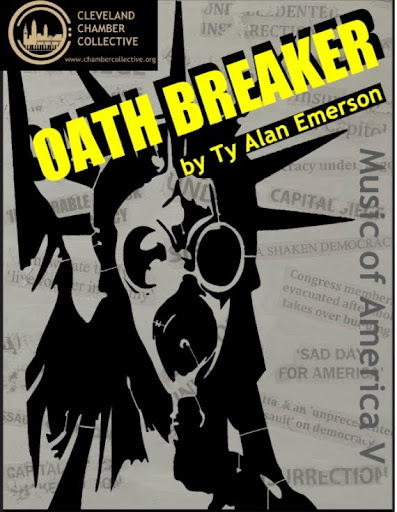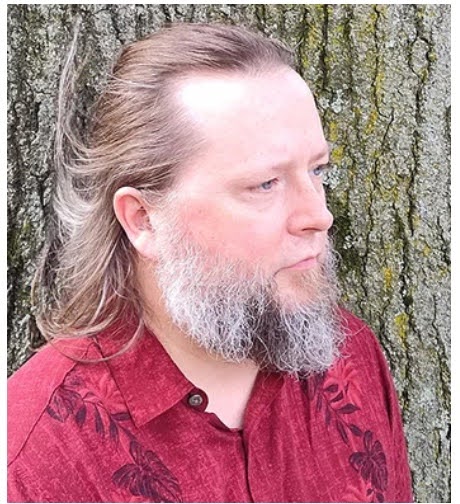by Mike Telin

On Saturday, April 20 at 7:30 pm at Disciples Christian Church, the Cleveland Chamber Collective will present the premiere of Emerson’s OATH BREAKER, a Requiem for chamber ensemble and digital playback. The work aims to take the audience on a 60-minute journey of anger, grief, and hope, while striving to come to grips with the events of January 6 and the subsequent fallout. The program will be repeated on Sunday, April 28 at 3:30 pm at the Pivot Center. Both performances are free.
Emerson said that he chose the frame of a requiem because the work is about emotional and spiritual processes, and writing it helped him work through the events and manage their emotional impact.
“When I was wrapping my head around the piece, I decided that I didn’t want to use the Latin text for the requiem because that didn’t seem right to me or for people who aren’t familiar with the liturgical text. I wanted to make it personal and relatable to everyone.”

Emerson also looked at many quotes by Abraham Lincoln and Barack Obama. “And I stumbled upon the Elizabeth I quote — ‘Grief never ends, but it changes. It is a passage, not a place to stay. Grief is not a sign of weakness nor a lack of faith: it is the price of love’ — which really solidified things. So it was kind of like hunting and tripping over a few things along the way.”
Emerson also sifted through reports from the January 6th Committee. “I would go to that website almost daily, reading the statements made by the officers. The problem was figuring out how to use it without having twenty pages of text. So I looked for phrases that captured the imagination. I took most of the texts that Mark Meadows was receiving during the insurrection and turned them into something like a 12-part fugue. I also used a quote from the leader of the Oath Keepers, ‘We’re not getting through this without a civil war.’”
The work is scored for flute, violin, viola, cello, piano, percussion, and electronics. “In the last movement, for example, I recorded several gongs, finger cymbals, and jingle bells, and electronically manipulated them to create other sounds that I used for the crowds.”
Emerson’s hope is that OATH BREAKER will help people find a positive way to effect change. “We don’t have to go down that rabbit hole again. We don’t have to let people bully the rest of the nation simply because they’re the ones who decided to be violent. We need to find a better path.”
Searching for that path brought Emerson to the Lux aeterna, in which he uses “lots of electronics, lots of jingly, brilliant sounds. There’s still a clash between the two environments with multi-tonalities coming at each other until we finally get to the end. That’s when I use the Obama quote, ‘We must preserve our freedoms for all people,’ and the Mandela quote about living so that others can live as free people too.’”
What does Emerson hope people will take away from the performance? “I want them to know that it’s okay to be mad, it’s okay to be terrified, it’s okay to be sad, and we’re always going to feel that day. Just like when the towers fell. These things are going to live with us, but it’s up to us to decide that we’re going to take things in a different direction. And that’s what I want people to do. Everybody in the room still has the power to do that.”
Published on ClevelandClassical.com April 18, 2024
Click here for a printable copy of this article



